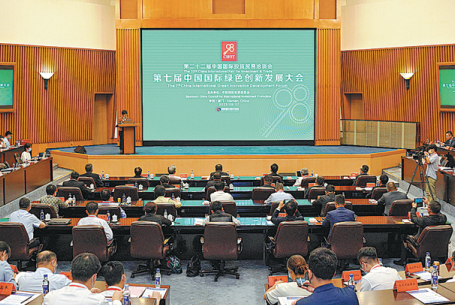Eco focus can spur economy, say forum delegates

The seventh China International Green Innovation Development Forum, which took place on Wednesday, has stressed the role of green and low-carbon development in boosting the global economy, experts said.
The forum is a supplementary activity at the China International Fair for Investment and Trade held in Xiamen, Fujian province, from Thursday to Sunday.
Business leaders and academic experts gathered at the event, offering suggestions to realize China's 2030 peak-carbon and 2060 carbon-neutrality goals.
Xie Zhenhua, China's special envoy for climate change, said when confronted with financial or technological hurdles, some countries have resorted to increasing their fossil-fuel consumption and carbon emissions.
However, the trend of realizing sustainable development around the globe cannot be turned back, he added.
Based on his research and observations, Xie predicted a technological revolution and industrial upgrades featuring green and low-carbon development are coming soon.
"People from all walks of society need to balance current and long-term interests. Eyeing their own interests and the common interests of all humankind, they should take green and low-carbon innovation as basic tools to cope with difficulties, and achieve a coordinated development with economy, society, energy, food, environment and climate change as part of the whole picture."
To date, a total of 136 countries have formulated long-term visions to achieve the Paris Agreement and the 2030 Goals for Sustainable Development, Xie said.
He added that the current industrial system is shifting toward a green and low-carbon direction.
Xie said that people should strengthen international cooperation, invest more in the construction of green and low-carbon projects, and learn from each other with the aim to solve difficulties and challenges.
At present, China has issued a series of policies to comprehensively implement carbon neutrality goals. In the future, China will optimize its energy structure, develop renewable energy, and promote industrial upgrades and the usage of energy-saving buildings and infrastructure, Xie said.
"Although we could use a book to explain the concepts of carbon neutrality, when a company really wants to push this kind of development, it still faces problems at a microlevel," said Bi Shunjie, a business manager from the consulting firm Ernst& Young Greater China.
Enterprises tend to take income and expenditure into account when making choices. They want to know what benefits they will gain if they implement such a development model, Bi said.
However, the model can bring real benefits. For example, it can enhance anti-risk abilities, help enterprises integrate with international trade and supply chain systems, and expand their involvement in higher-level markets, Bi said.
Li Jiancheng, vice-governor of Fujian province, explained Fujian's achievements after practicing such a concept in economic and social development.
To date, the forest area in Fujian has exceeded 700 million cubic meters. The forest coverage rate reached 66.8 percent and has remained the highest in China for 43 consecutive years.
The proportion of days with excellent air quality reached 99.2 percent in 2021, and 97.3 percent of its 12 major river basins were evaluated as having excellent water quality.
Adhering to the concept of clear waters and green mountains being as valuable as gold and silver, the vision of Fujian becoming a special place with a picturesque environment is becoming reality, Li said.
In addition to the forum, an exhibition to showcase the innovation and products of such development was officially opened at the CIFIT.
In the 6,000-square-meter exhibition area, there is a display of intelligent healthcare products, ecological recovery and environmental protection solutions. Low-carbon technology that serves people's well-being is also an attraction for visitors.



















